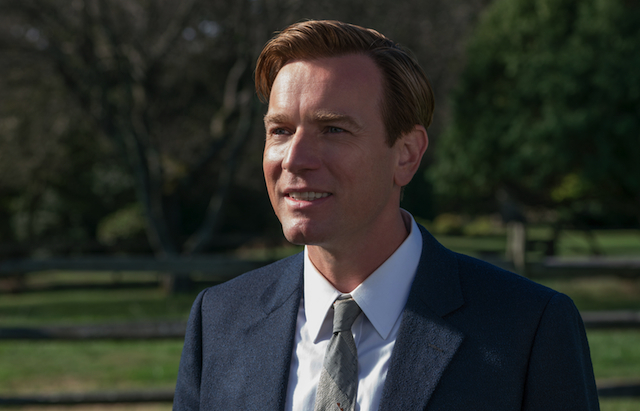CHICAGO – In anticipation of the scariest week of the year, HollywoodChicago.com launches its 2024 Movie Gifts series, which will suggest DVDs and collections for holiday giving.
‘American Pastoral’ Should Have Been Put to Pasture
 Rating: 2.0/5.0 |
CHICAGO – Change can be a frightening part of life and the human experience. It is an unavoidable but often necessary transition for progress. If you fight change or innovation, the stagnation alone will weigh you down and hold you back. “American Pastoral” may deal with the themes of revolution, but that’s about all that is revolutionary or unique about this film.
Ewan McGregor flexes his directorial muscle for the first time, but the sheer heft of the material proves to be beyond his weight class. Having no prior experience in the director’s chair, McGregor does his best with the material given to him. Inheriting the reins of this long troubled project greatly hindered McGregor’s chance at a true first impression for his directorial debut. He goes through the motions of leading this project by moving through the most overused filming techniques that film students learn in their first year. Everything from his framing to transitions for the passage of time are part of the greatest hits of any novice filmmaker that has yet to find a style or voice of their own.

Ewan McGregor Performed in and Directed ‘American Pastoral’
Photo credit: Lionsgate
What McGregor lacks in a unique voice he makes up for in visual style. He has a clear vision of the aesthetic for the time period and recreates it perfectly. He highlights the idyllic serenity in which our main protagonist views his life by painting every scene with warmer tones and vibrant colors. As he becomes more disillusioned with the reality he finds himself, his world takes a much cooler tone with the once vibrant colors turning into paler versions of themselves. Its something we have seen done many times before, but it shows that McGregor has promise stylistically even if he hasn’t figured out how to apply the same technique narratively.
The framing device alone, which is the only reason the film gives us to take a look back in time at this story, is haphazardly incorporated into “American Pastoral”. The two parts feel inorganically smashed together and an unwelcome distraction every time it is forced on-screen. The entire storyline introduced with the prologue and epilogue ends up becoming unnecessary and is only there to try and maintain the same narrative structure as the novel it is based on. The only reason it works in the novel is because he is a character we have encountered before in the author’s other works, but in a film he just feels like a stranger that seems to know us but who we know nothing about.
Philip Roth’s novels consist of complicated character studies that examine an important time in history and the effects it had on the average person. Adapting all the nuance and attention to detail the novels are filled with is a difficult task, but not impossible. Earlier this year we saw it done successfully with “Indignation”, but “American Pastoral” proves to be a cautionary tale on what can happen when it is attempted carelessly. The bulk of the film’s problems don’t rest with McGregor’s uninspired filmmaking, but are actually caused by a terrible novel adaptation.
Screenplay writer John Romano, who has had exponentially more experience writing for television than he has film, tried his hand (unsuccessfully) at adapting the Pulitzer-winning novel by Roth. His previous experience with “The Lincoln Lawyer” showed promise but ultimately proved not enough to tackle the depth of “American Pastoral”. Romano’s biggest problem was trying to stay faithful to the novel’s framing device, which would never have worked cinematically, in exchange for sacrificing some of the needed development for the characters. Every character felt flat, with little to no underlying complexity. We see them, but never truly ever get to know them, making their actions and decisions come off as irrational at times.

Dakota Fanning and Ewan McGregor in ‘American Pastoral’
Photo credit: Lionsgate
“American Pastoral” is filled with solid performances from Ewan McGregor, Jennifer Connelly, Dakota Fanning and Uzo Aduba. They each perform admirably and try to carve some definition into their characters, but they aren’t given nearly enough to move their characters beyond one-dimensional. We develop bonds and connections to characters as we get to know them, but many of the details got lost in translation from novel to film. We are left with characters who aren’t memorable or worth investing in, and only creates a feeling of numbness at every emotional climax we are thrown.
The passion was taken out of “American Pastoral” and replaced with nothing but visual filler trying to trick us into believing its style translates to some form of substance. The years of trying to get this film made doesn’t equal the final product, which just leaves the audience thinking “American Pastoral” should have been put to pasture instead of production.
 | By JON ESPINO |


